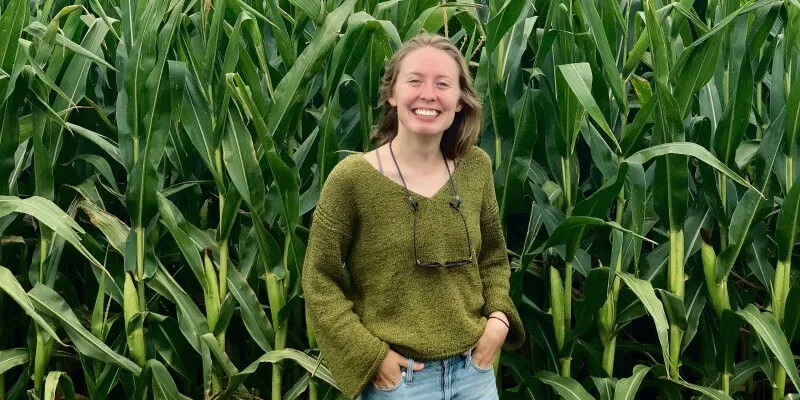Lucia Possehl ’20 was hoping to be in Denver this week to present her research at the American Association of Geographers. Due to the COVID-19 pandemic, she’s staying home in Minneapolis, completing her final UVM semester online.
She misses her friends, her faculty mentors, and springtime in Vermont. But she’s also had time to reflect on her academic career at UVM, which includes winning the 2020 Student Award for Outstanding Leadership in Service-Learning by UVM’s Office of Community-Engaged Learning (CELO).
A geography major with minors in history and environmental studies, Possehl worked as a service-learning teaching assistant (SLTA) in three courses taught by Professor of Geography Cheryl Morse. It was Morse who showed Possehl that geography was much more than reading maps.
“I came in as an environmental studies major,” she said. “I was interested in the idea of place—the history and culture you’d associate with different places,” she said. “Cherie showed me that geography was a super-rich interdisciplinary field that brought all those interests together. It clicked right way for me.”
As a junior she served as Morse’s TA for “Place, Landscape, and Environment in Vermont,” a geography course for first year students in the Earth and Environment Program. The class project was offering re-design ideas for Chittenden Solid Waste District’s drop-off centers. “Our job was to study the way people used the sites and recommend improvements,” said Morse. “Lucia led students through learning research methods and executing design projects.”
This term Possehl is TA’ing for an Honors College first-year class Morse is teaching that is conducting research on food access in Franklin County for community partners Franklin Grand Isle Community Action and the Northwest Regional Planning Commission. (In Franklin County over 10% of the population is food insecure, meaning many residents can’t regularly count on having enough nutritious foods in their diets).
Possehl essentially served as an adjunct for the class, accompanying students on site visits as they learned different tools social scientists use, including mapping, oral history and participant observation.
“She’s taught students not only how to do outstanding qualitative research, but how to think reflexively about their own identities in relationship to this research,” Morse said of Possehl’s work. “She brings a deep respect for others, a sensitivity to ways people are different from one another, and lots of flexibility to handle any obstacle that comes our way in the messy process of doing fieldwork.”
Over the last year, Possehl developed her own oral history project designed to document the history of the opioid epidemic in Vermont. She interviewed Vermont addiction medical doctors, journalists, harm-reduction practitioners, and policymakers to understand the construction of opioid use disorder care networks across the state. The research morphed into her senior thesis, closely supported by Morse and Possehl’s mother Amy Sullivan, an oral historian at Macalester College in Minnesota. Possehl is also collaborating with the Vermont Folklife Center in Middlebury, Vt., to archive her interviews.
With her post-UVM plans now on hold, Possehl is looking forward to doing more place-based research, perhaps in Vermont, and she sees graduate school and rural community engagement as part of her future.
For now, she draws inspiration from the resilience of communities facing a new challenge—getting food to people who need it during the coronavirus crisis.
"You see Vermont bus drivers making the rounds, dropping off food for kids and families across the state. It is a beautiful example of how, despite our tenuous moment, people are continuing to work day and night to support food access programs across the state. I have deep respect for folks who are dedicating their lives to support their neighbors, elders, and communities of need during these challenging times."
Each year The Office of Community-Engaged Learning (CELO) recognizes faculty, students and community partners for their leadership in creating transformative learning experiences that meet community needs. These service-learning courses, designated at UVM since 2007, connect academic learning goals with community work and projects. Together, about 50 faculty members, teaching 100 courses, with over 200 community partners, create real-world learning experiences that reach over 40% of UVM's graduating seniors.
